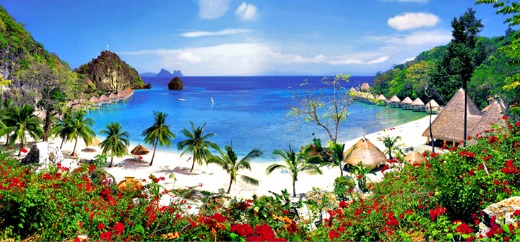Philippines, Australia set up Landmark Project to tap ‘Natural Blue Capital’
The Philippines and Australia have formally launched a landmark project that aims to quantify the value and market potential of the country’s coral reef and mangrove ecosystem services, also known as “natural blue capital.”
Under the Capturing Coral Reef and Related Ecosystem Services (CCRES) project, the two countries will work together to come up with innovative models for valuing mangrove, seagrass and coral reef ecosystem services with the potential to enhance the sustainability of marine-based enterprises and marine spatial planning in select coastal communities in the Philippines.
The project launch, held at the Oakwood Premier Joy~Nostalg Center in Pasig City on July 7, was attended by representatives of implementation partners that include the UP Marine Science Institute; Palawan Council for Sustainable Development; the municipal government of El Nido, Palawan; Palawan State University; El Nido Foundation; and the Department of Environment and Natural Resources (DENR) through its Biodiversity Management Bureau (BMB).
BMB Director Theresa Mundita Lim said the agency was looking forward to implementing the project, which recognizes the value of blue capital and its potential for growth.
“The project will help us convince stakeholders that the environment is a good investment as it benefits the communities,” Lim said. “The science will be useful in helping us make informed decisions about other projects we need to identify and implement, and in answering queries about budgetary allocations.”
She added: “The information generated from this project will be translated into new policies or update existing ones so that we can replicate this in other coastal communities.”

El Nido, Palawan, Philippines
Aside from the Philippines, the CCRES project will also be implemented in Indonesia for a period of five years. As the implementing agency, the Global Environmental Facility (GEF) through the World Bank has committed US$4.5 million.
An advisory board, comprising of representatives from the WB, co-financing partner, WB regional projects and a government representative per country, serves as an executive committee for the CCRES project which will be responsible for decisions relating to annual work programs and the allocation of financial resources for the various components of the project.
For the Philippines, the government representative to the advisory board is DENR Undersecretary Analiza Teh.
A project executing agency, on the other hand, has been established in the Global Change Institute at the University of Queensland which will coordinate the management of the project.
Specifically, the CCRES project will be research-based, studying the equivalent market value of services provided by healthy or thriving seagrass beds, mangrove forests and coral reefs such as food security, ecotourism, coastal protection, blue carbon sequestration,and timber production, flood control, disease regulation and recreational facilities.
Coastal communities can then develop new eco-friendly and sustainable enterprises to increase revenue and improve their resilience to climate change impacts.
El Nido, a first class municipality and a protected area, will serve as the pilot site for the project in the Philippines.
The implementation of the CCRES in El Nido has already gained the approval of the El Nido-Taytay Managed Resources Protected Area Management Board (PAMB).
The protected area, which covers over 54,000 hectares of marine waters and 36,000 hectares of land, has been a favorite eco-tourism destination for its natural features like limestone cliffs, mangroves and clear waters, all providing habitat to many endemic flora and fauna.
The tourist boom, population growth, and inflation are, however, also becoming areas of concern for the environment. The CCRES project is seen to assist the local government and the PAMB determine the “carrying capacity” of the area for economic and social activity. (DENR)


